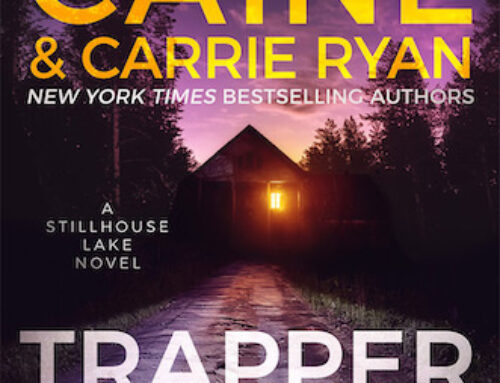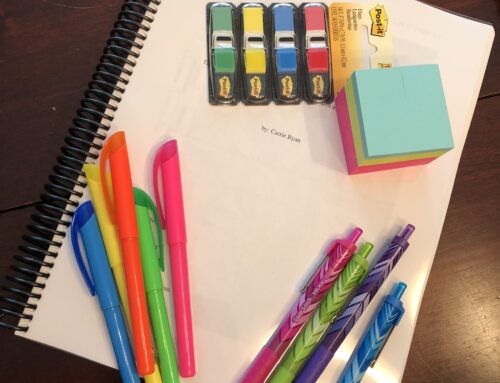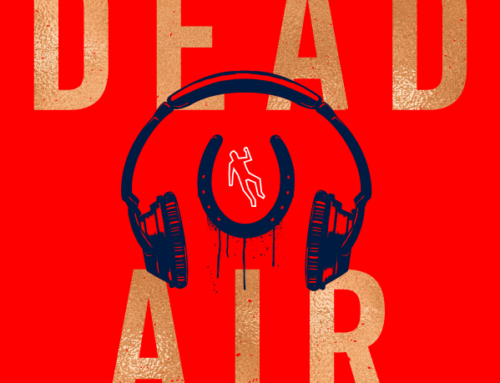I’m not sure I’d have ever written The Forest of Hands and Teeth if it weren’t for NaNoWriMo. For those of you who don’t know, NaNoWriMo is National Novel Writing Month and it takes place during November every year. Essentially, it’s a time where individuals pledge to write a novel (defined as 50k words) in a month. There’s a huge community built up around it full of support and encouragement and there are many authors who credit NaNoWriMo as a jumping off point for their novels (Erin Morganstern, Diana Peterfreund, Marissa Meyer, ) and many many others — there’s a whole list here.
Back at the start of 2006 I decided that I wanted more than anything else to be an author and I gave myself 10 years to achieve that goal. Essentially I figured that if could write/revise/submit a book a year, then if after 10 books I hadn’t made it I could re-evaluate. But until then, it was “head down, keep writing, don’t let rejections turn you from your course.”
So throughout 2006 I wrote. I started a contemporary romance, a teen vampire chick-lit, a teen paranormal, and a teen contemporary. On all of these projects I wrote a fair amount of words, but I’d finished nothing. I took a class on writing YA in the fall and started a book that I was enjoying, but the teacher was a bit delayed in getting pages back to us and so I was a bit stuck — not wanting to write more until I’d gotten feedback on what I’d already written.
Then, in October, I learned about NaNoWriMo. This sounded like a great idea to me — a way to really motivate and get pages done — and so I decided to sign up. The only problem? One of the rules is that you have to start word 1 on day 1 — you can’t start in the middle of an already written project. I’m a stickler for rules and so I decided I needed a new idea.
I couldn’t come up with one. I asked my husband, “What should I write?” He said, “Write what you love.” I said, “That would be the zombie apocalypse but NO ONE wants to read about that.” He gave me that “you know I’m right” look.
He was right. On Thursday, November 2, 2006 I was walking home from work and a line popped into my head that I liked. So I emailed it to myself myself. The email is time stamped 6:38PM and has the subject “meh” and says: “My mother used to tell me about the ocean. She said there was a place where there was nothing but water”
If you’ve read The Forest of Hands and Teeth, you’ll recognize that as the first line and start of the second. I got home from work that night and I started writing. I wrote throughout November. I didn’t “win” NaNo (meaning I didn’t reach 50k words). But that was okay.
Here’s why NaNo matters so much to me: First, I never expected The Forest of Hands and Teeth to sell. I was convinced no one would ever be interested. I’d spent so much of 2006 trying to write a book that might sell and I don’t know if I ever would have “wasted” time on a project I didn’t think would go anywhere. Except that NaNo had given me this freedom to just take a month and write. On a project that probably wouldn’t sell. And using a brand new voice.
If I lost one month out of the year on a project that would never sell — so what? I *loved* writing Forest and in November I got to indulge in that. I got to experiment on a new voice and story without feeling like I was diverting from the course I’d set for myself.
Second, NaNo is about community as well as words. There’s a website with forums and message boards and they’re full of people who are indulging in the same passion you are. It can be difficult in our daily lives to find someone who understands when you talk about trying to figure out how to get to the inciting incident, how to balance writing with life, etc. NaNo is an easier way to meet those people and make friends. In fact, I became friends with Diana Peterfreund — now one of my critique partners and closest friends — during NaNo in 2006 (other than my husband, she was the first person to read pages on Forest and her enthusiasm was HUGELY instrumental in me continuing with the project past November).
Third, while “winning” NaNo means writing 50k, to me the real “win” is that for a month you put writing first. That November, I came home every day after work and I wrote (well, almost every day). Because I expected it of myself, because I enjoyed watching my word meter tick up, and because I had other people watching that word meter tick up too. Like I said, I loved writing Forest and NaNo gave me a reason to indulge in that love.
I get asked all the time what advice I have for writers and it is this: write. It’s so easy to talk about writing, think about writing, plan to write, and so easy to somehow just not end up writing. It’s easy to find other things to fill that time: work, cleaning, reading, the internet, balancing the checkbook, friends, family. I’m not saying these things aren’t important — they very much are. But I know so many writers who put writing at the bottom of the “to-do list” and never at the top.
NaNoWriMo is an excuse to put writing at the top. It’s a month where your goal is to indulge in writing. You can allow your house to get a little messier, you’re allowed to microwave dinner, you’re allowed to turn off the TV and tell friends that maybe you’ll take a raincheck on that movie.
You’re allowed to put writing first.
I’ve learned that I’m not good at word count challenges. I’m too competitive and I’ll sacrifice quality for quantity. And while there’s a balance to be had, I know myself well enough to know that sometimes I have to slow down my writing to make sure the story is still on track. Too many times I’ve barreled headlong in the wrong direction in the name of more words. Clearly NaNo isn’t for everyone and I’ve actually talked authors down from NaNo — letting them know that it’s okay to not hit that 50k word goal in a month. Because it *is* okay.
There are those who are anti-NaNo because it inevitably leads to people sending off shoddy, unrevised drafts to agents come December first and that’s a legitimate concern and it’s not the way to get published. I didn’t finish writing Forest until April and then I revised it over and over and over and over before querying agents in August 2007. Erin Morgenstern got the idea for The Night Circus during NaNo 2005 and drafted it during NaNo 2006 and 2007 (link here). Marissa Meyer wrote Cinder during NaNo 2008 but revised it before querying agents in 2010 (Link here). Diana Peterfreund began Rampant during NaNo 2006 and worked on it through the rest of the year.
The point is — what you write in NaNo is a draft and often a very very rough draft at that. Some people will put that draft in a trunk, brush their hands and be happy with the bragging rights that they wrote a novel (and they did! Good for them!) and some will trash what they’ve written because it’s not what they want it to be and they want to head in a different direction (which is fine!) and some will start the long process of revising the draft into something they can move forward with (also great!).
For me, NaNo isn’t about writing a perfect draft you can turn around and sell. It’s about putting writing first, giving yourself permission to experiment, and, if you’re interested and it won’t detract from your writing time, participating in a supportive and vibrant community of like-minded folk.
In November 2006 I wrote 20,000 words of The Forest of Hands and Teeth. I didn’t win NaNo, but I did achieve much larger goals. I finished that book, revised it, and sold it. Maybe I would have done it anyway, but I’m not really sure I would have given myself the time to experiment with an “unsellable” idea and an experimental new voice. It turns out, what I really needed was permission to indulge in what I really wanted to write in the way I really wanted to write it. I used NaNo to give myself that permission.
Good luck to all the NaNo participants out there: write boldly, write with passion, put your writing first but be kind and gentle with yourself if you don’t hit that 50k word mark by the end of the month. Sometimes, something like NaNo is a tool to help you reach that bigger win.





Whoa. Love this, Carrie! This is my third year doing NaNo, and I haven't won yet. But I've never felt like a failure. That September of the first year was the first time I'd allowed myself to actually stop thinking/talking about writing and actually start writing. So that's what I did that November. I wrote a completely different verson of the same idea last year and actually finished that draft (in February). This year will be the third incarnation of the same (yet not at all the same) novel and I'm super excited about it.
I've been doing NaNo for five years and finally "won" last year (it was a BIG DEAL for like, weeks). I'm one of those writers who needs to fast-draft the first time around because all my best work comes during revisions. I love how you emphasize that it's different for everyone!
This is a fantastic post! (I'm going to link to it on my own blog because I think all writers, NaNoing or not, should read it). This really captures how I feel about NaNo. It doesn't have to be about winning, it's about taking a chance and seeing where it takes you.
I agree that doing NaNo isn't about winning, it's about indulging in the idea you were previously afraid to write. I love knowing a little more about how Forest came to be (love that book, btw!). This is my 11th NaNo and I've enjoyed every one I've done, whether I win or not. I also agree the friends you make are awesome and understand you like no one else.
The Forest of Hands and Teeth is the reason I did NaNo in 2011, and I just found an agent from that heavily revised manuscript. I'm jumping into NaNo again this year for the excitement of community (and to distract myself from going on sub) and the permission to draft fast and messy. I'll be paying for it in December, but for me getting that 1st draft out is worth all the craziness and the revising to come.
Great post.
Robin — that's so cool!! Congrats on getting an agent! Wow and YAY!!
Leigh — so glad you were able to just start writing! So often that's the hardest part!
Excellent job winning Emmy – very amazing!
I like how you describe NaNo as taking a chance, Kate, because I think that's really true. I think it can sometimes be really hard for authors to take a chance, especially when there's a fear of committing to an entire year on a project and not knowing if it's worth it!
Eleven NaNos Erin — wow!!! That's fantastic!